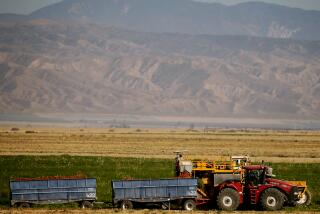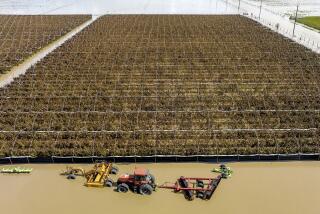Apple Growers to File Lawsuit in Alar Dispute : Agriculture: Eleven farmers will seek $250 million from ’60 Minutes’ and an environmental group. They charge ‘product disparagement.’
- Share via
Washington state apple growers said they intend to seek $250 million in damages from CBS-TV’s “60 Minutes” program and the Natural Resources Defense Council, an environmental group, for “product disparagement” stemming from last year’s controversy over the use of Alar, a growth enhancement chemical, on apples.
The Alar Class Action Committee, a coalition of growers, said it will file a lawsuit in Yakima County Superior Court on or before Nov. 30 charging that the NRDC used “bogus” information to create a hysteria about red apples last year.
The NRDC published a study last year entitled “Intolerable Risk: Pesticides in Our Children’s Food.” In publicizing the report, the NRDC and a Washington-based public relations firm, Fenton Communications Inc., focused on the use of Alar, which in some cases is a suspected carcinogen.
News of the study, which claimed that children are at a heightened risk of cancer from pesticide residues in produce, first aired on “60 Minutes” in February, 1989.
“As apple growers, we suffered tremendous losses (because of) unscientific and unfounded information,” said Robert Brody, a Wenatchee, Wash., apple grower who is one of 11 plaintiffs in the planned suit. “Extremists such as NRDC . . . are telling the American public that the farmer today is poisoning the food supply. We want to stop that crap.”
Industry estimates place 1989 losses to growers from consumer resistance to fresh apples at $150 million. Processors of juice and other apple products also lost another $100 million, the growers claim.
Roy Burnett, a press representative for “60 Minutes” in New York, said: “We stand by our report.” He declined to discuss the growers’ specific complaints. Al Meyerhoff, a San Francisco-based attorney for the NRDC, said that the group had little to say until the growers’ suit is actually filed.
Food industry scientists charged that the NRDC study was not scrutinized by outside experts before publication and that it exaggerated cancer risks and embellished worst-case scenarios.
David Fenton, president of Fenton Communications Inc., said that the NRDC report did undergo a peer review process and that “apple growers knew for years that Alar was dangerous.”
Alar was voluntarily withdrawn from the market in 1989 by its manufacturer, Uniroyal Chemical Co. Inc., after the federal Environmental Protection Agency announced a proposed ban of the compound.
More to Read
Inside the business of entertainment
The Wide Shot brings you news, analysis and insights on everything from streaming wars to production — and what it all means for the future.
You may occasionally receive promotional content from the Los Angeles Times.










